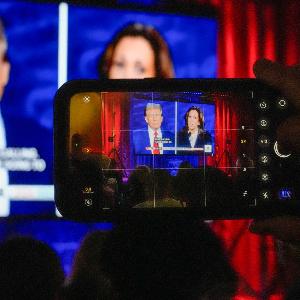The US election and its consequences for Europe
25 Sept 2024
Voters in the US will go to the polls on 5 November. What should Germany and the EU expect? An interview with LMU political scientist Tim Heinkelmann-Wild.
25 Sept 2024
Voters in the US will go to the polls on 5 November. What should Germany and the EU expect? An interview with LMU political scientist Tim Heinkelmann-Wild.

© picture alliance / ASSOCIATED PRESS / Morry Gash
At LMU’s Geschwister Scholl Institute, political scientist Tim Heinkelmann-Wild conducts research on topics such as the role of international organizations in a changing global power structure. In our interview, he explained the foreign policy positions of US presidential candidates Kamala Harris and Donald Trump – and what scenarios Europe should prepare for in either case.
What is the traditional stance of the Democrats and the Republicans on Germany and Europe?
Tim Heinkelmann-Wild: Before the Second World War, the US behaved in a more isolationist manner across party lines. After 1945, there was a shift toward an “internationalist consensus” across both parties, albeit with varying nuances. The US committed to collaboration with its Allies in Asia and Europe, investing heavily in these partnerships and in the so-called Liberal International Order. Over time, this consensus gradually eroded – for instance in response to the Vietnam war, but also due to the unilateralism of George W. Bush Jr.’s during the “War on Terror”. That said, the kind of entrenched party-political polarization we currently see on domestic policy issues has been less pronounced in foreign policy up to now. The motto was: “Politics stops at the water’s edge.”
Trump’s government terminated US contributions to – and even the membership in – international organizations and agreements.Tim Heinkelmann-Wild
How did US foreign policy and the American view of Germany and the EU change during Donald Trump’s first term in office?
Under Trump, we saw the clearest break with the “international consensus” so far. The Liberal International Order can be understood as a combination of liberal policies and the pursuit thereof within the framework of multilateral institutions. Under Trump, the US withdrew from this order to some extent. This was apparent in his harsh rhetoric, but also in illiberal policies, such as protectionism. The latter translated into a trade war with China, but also into customs tariffs in respect of the EU. Instead of George W. Bush Jr.’s unilateralism, he embraced isolationism.
Trump’s government terminated US contributions to – and even the membership in – international organizations and agreements. Examples include the Paris Agreement on climate change, the Iran deal, and the UN Human Rights Council. Trump even wanted to pull the US out of the World Health Organization during the coronavirus pandemic. All in all, this constituted a huge shock for many institutions – and for the Western partners of the US.
Much of what Trump initiated and advanced in political terms can be understood as a departure from US hegemony within the international order.
In some respects, US foreign policy under Trump puzzles researchers.Tim Heinkelmann-Wild
Why did a US president want to abandon US hegemony?
In some respects, US foreign policy under Trump puzzles researchers. Why? Because the US benefits more than virtually any other country from the Liberal International Order. There are some theories that could explain this course of action, however: Trump is often described as irrational, his decisions are called idiosyncratic. Criticism of multilateral institutions and putting an end to US support for them obviously ties neatly into a populist narrative: Control was being taken back, money wasn’t going abroad but was rather invested domestically.
On the other hand, the way in which international organizations were criticized or weakened also reflected strategic considerations: Where quick concessions could be expected, the criticism was limited. Where blocking tactics were an option, the Trump Administration stayed within the institution but blocked it in order to force concessions. If there were no obvious advantages, he would withdraw. In line with Trump’s business mentality, more benefits for the US were negotiated in this way.
Joe Biden is a proponent of internationalist thought. He is a Transatlanticist. Right at the start of his presidency, he made the promise that “America is back”.Tim Heinkelmann-Wild
After Trump’s period in office, did Joe Biden reverse these tendencies again – or did he continue with many of them?
Joe Biden is a proponent of internationalist thought. He is a Transatlanticist. Right at the start of his presidency, he made the promise that “America is back”. The EU and other Western partners pinned high hopes on this promise. And indeed, the US has come back to the table in some areas under Biden. Examples include the Paris Agreement and UN organizations such as UNESCO, the UN Human Rights Council, and the World Health Organization.
There are other steps that Biden never reversed, though, including termination of the Iran deal, the Trans-Pacific Partnership Agreement, and the Open Skies Treaty. Nor were the gaps in climate financing fully plugged under Biden.
We even see new protectionist policies under Biden in trade that clearly counteract WTO rules. The Inflation Reduction Act is one example. Nor were any new multilateral treaties or organizations initiated on Biden’s watch. Instead, the US focused on the Europeans and the Western alliance and created many bilateral agreements with selected partners.
What should Germany and the Europeans expect under a President Kamala Harris? What would she do differently to Biden and Trump?
Bearing in mind her generation, Kamala Harris is certainly not as profoundly socialized into American internationalism as Biden. As Biden’s vice president, however, she backed his policies and would probably stick to the existing course in many areas.
If you compare the specific content of her policies with that of Trump, you see that, in many areas, the two differ less markedly than one might think. Harris’ attitude toward China is similar. Both demand that the EU should do more, and both put customs tariffs on the table, albeit to a differing extent.
There are major differences in relation to NATO and the Ukraine conflict: Trump criticizes NATO fiercely, threatens to leave the alliance, and wants to end the Ukraine war immediately at whatever cost. Harris stands by NATO, but again insists that Europe must step up its commitment. Unlike Trump, she also adopts more liberal positions on topics such as women’s rights and migration, which also play a role in the international arena.
What could we expect of a second Trump presidency?
Looking at the academic and public discourse around previous statements and plans such as “Project 2025”, it appears that Trump 2.0 would bring not only a continuation of his isolationist, illiberal policies, but that he would actually escalate his previous actions. Not only NATO and the WTO, but also other international organizations that are effectively bulwarks of US hegemony within the international order are targeted by criticism – among them the International Monetary Fund and the World Bank.
US support for multilateral institutions has always been ambivalentTim Heinkelmann-Wild
How should Germany and the EU prepare for these two different scenarios after the US elections?
It is likely to be expected that the US will withdraw from international organizations and agreements – or at least demonstrate less commitment under both candidates. My research on this subject shows that, while Trump was the president who initiated the most withdrawals from international treaties and organizations, US commitment to the Liberal International Order has always been selective. Many cases of US withdrawal of support from multilateral institutions could also be cited under presidents such as Clinton, Bush Jr. and Reagan. That is not to play down Trump’s role: The ferocity of his rhetoric and his illiberal stance were exceptional.
But if you are asking yourself how the EU and Germany should position themselves in their relationship with the US in the future, it is important to look at commonalities and long-term trends behind the individual candidates. US support for multilateral institutions has always been ambivalent, and three trends mean that we could well see this again in the future: First, we never had so many and so influential international institutions that can limit even the US’ room to maneuver and could therefore become targets. Second, the polarization of domestic policy in the US is increasing, even with regard to international politics, and that will make it harder for Congress to arrive at compromises on foreign policy. Lastly, the US and the West are losing influence relative to emerging powers such as China and India, and they also find themselves confronted by revisionist and illiberal states such as Russia.
The EU should pool and ramp up its own capabilities from defense to finance. Only together the Europeans have enough “hard power” to make a difference on the international stage regarding problems from the environment to security policy.Tim Heinkelmann-Wild
It sounds like Europe will have to become more independent. How can it do that?
My research shows that alternative leaders in particular are crucial to the resilience of the Liberal International Order and the multilateral institutions that support it. These may be governments in the Western camp or the EU, but also the secretariats of international organizations. They can organize coalitions of supporters to respond collectively to US withdrawal and to solve problems even without the US in the future.
There are a couple of key imperatives for the Europeans if they want to preserve the Liberal International Order: First, they should continue to support multilateral institutions and keep to their rules in order to uphold their good reputation as advocates of liberal principles. Doing so will also strengthen the “soft power” with which they can persuade new partners to join their coalitions. Second, the EU should pool and ramp up its own capabilities from defense to finance. Only together the Europeans have enough “hard power” to make a difference on the international stage regarding problems from the environment to security policy. Here, it is also important to be aware of own dependencies and to scale these back. The European attempt to save the Iran deal, for example, failed due to the dominance of the US Dollar in the international financial system. Third, the secretariats of international organizations are the strongest fighters for their own survival. They embody the values of their institutions. These organizations should therefore be reinforced, for instance, by means of higher financial contributions and they should be made more independent of individual member states.
What part is foreign policy actually playing in the US election campaigns right now?
Although the wars and global conflicts are certainly addressed and discussed in heated debates, the US elections will be determined rather by domestic policy issues. But regardless of the American people’s decision on 5 November, Europe must ready itself for anew instances of US withdrawal from the Liberal International Order.

© David Fisher/Oxford University
Political scientist and post-doctoral researcher Dr. des. Tim Heinkelmann-Wild is a research associate at the Chair of International Relations (Professor Berthold Rittberger) and at the Chair of Global Governance and Public Policy (Professor Bernhard Zangl) at LMU’s Geschwister Scholl Institute.
He conducts research into issues such as the role of international organizations in a changing global power structure. His doctoral thesis investigated US withdrawal from international institutions and its impact on the international order.